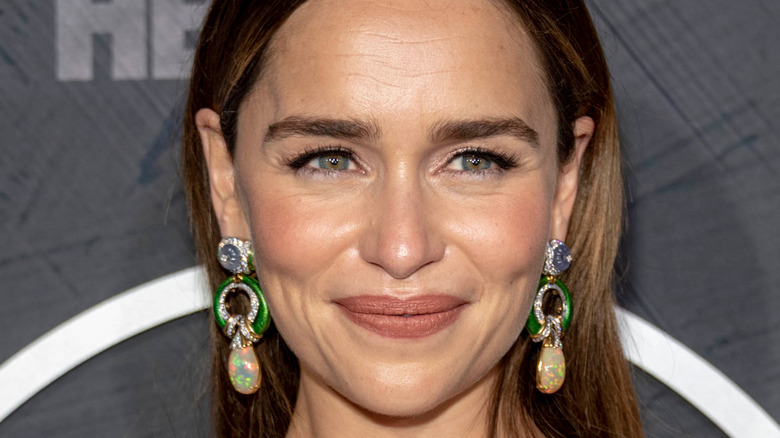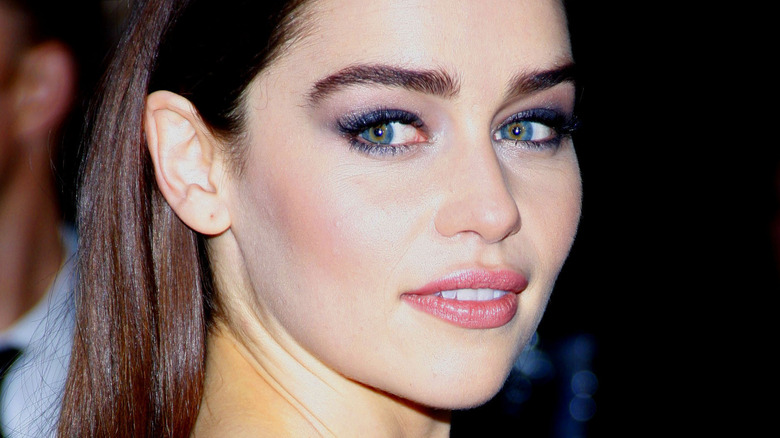You Probably Never Noticed This About Emilia Clarke's Eyes
Emilia Clarke took the world by storm in the early 2010s with her breakout performance as Daenerys Targaryen on HBO's "Game of Thrones." From 2011 to 2019, Clarke portrayed the series' wildly popular character, whom the New York Times dubbed as one of series mastermind George R.R. Martin's "finest creations." With her dazzling charisma, captivating personality, and impeccable acting skills, Clarke's position as a Hollywood stalwart is undeniable.
Initially cutting her teeth at the Drama Centre London — which she got in "by the skin of my teeth" (via Rolling Stone), the actor scratched and clawed her way to the top in a path that not many realize was so difficult. Initially applying to "RADA, LAMDA and Guildhall, a trifecta of hallowed institutions for British would-be actors," Clarke would eventually get rejected from all institutions before striking gold with the Drama Centre London, where she graduated from in 2009 (per UAL).
Clarke eventually made her way onto television screens around the world in her third role ever as the popular Targaryen in "Game of Thrones." Sporting a blond mane along with her stunning beauty, the presence of Targaryen always made for a picturesque visual on-screen. And while the blond Targaryen get-up was just a wig, there is one subtle factor that you may not have noticed that makes her beauty even more unique.
Can you spot the unique characteristic that Emilia Clarke possesses? If not, read on to find out more!
Emilia Clarke has a condition known as heterochromia
Emilia Clarke sports one interesting quirk (which she also happens to share with Mila Kunis and Kate Bosworth) that not that many people have. It's a condition known as heterochromia, which WebMD defines as "when a person has differently colored eyes or eyes that have more than one color." The website also notes that the condition "doesn't cause any problems" for the most part and that it's usually "just a quirk caused by genes passed down from your parents or by something that happened when your eyes were forming."
There are three different types of heterochromia per WebMD — complete, which is when both irises are completely different colors; segmental, which is when one iris contains multiple fragments of color; and central, which is when the iris' outer ring sports a different shade opposed to the rest of the structure. So which type of heterochromia does Clarke have? The actor actually has the latter (per The Things), given that the outer part of her iris is blue while the inner part is a unique shade of green.
With Clarke's heterochromia, the subtle condition upped the ante on her sex appeal even more — thus affecting her acting career in the process. This leads to one question — how exactly did Emilia Clarke's heterochromia and sex appeal affect her career? Keep reading to find out!
An unorthodox award and a ton of nude scenes
Though "Game of Thrones" will most certainly be remembered for its remarkable writing and extraordinary storytelling, the show was also undoubtedly marked by the plethora of nude scenes and sex scenes that would take place onscreen — most of which involved Emilia Clarke.
In an interview with Vanity Fair, Clarke opened up about her initial feelings towards nude scenes, especially considering that she was fresh out of acting school at the time. Upon getting cast in Season 1, Clarke quickly realized "the catch" of the gig, which was "a f*** ton of nudity." "I'd come fresh from drama school and was like, 'Approach this as a job,'" Clarke revealed to the outlet, recalling that she "[floated] through" the filming of the nude scenes at the time. Clarke then discussed her thought process as a young actor partaking in the lascivious scenes. In the interview she recalled, "Whatever I'm feeling is wrong; I'm gonna go cry in the bathroom, and then I'm gonna come back and we're gonna do the scene," hoping it would "be completely fine," though "it was definitely hard."
Beyond the screen, Clarke was even voted as Esquire's Sexiest Woman Alive in 2015 in the publication's last year of running the polarizing award.



